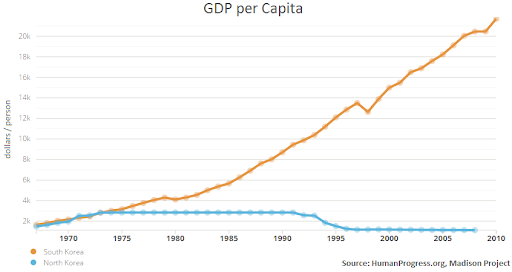PATRICK POLESHUK WRITES- If the recent Trump-Kim summit has told us anything about North Korea’s relationship with the U.S, it is that the two leaders appear to be on separate wavelengths. The summit’s location in Hanoi, Vietnam, while comfortable and convenient for both Donald Trump and Kim Jong-Un, was not enough to save what would be another failure to denuclearize the Korean Peninsula.
All is not lost, though. Hanoi, the summit site, was otherwise an inspired choice. Given Vietnam’s transformation from a state-planned economy into one now facing a GDP explosion, the Trump Administration is believed to be hopeful that North Korea, like this communist country before it, has a bright future in following the path to economic reform.
Certainly, as North Korea continues its downward trek to national impoverishment, with extreme poverty reaching a shocking 50% among its citizens, and a GDP per capita of less than $2,000 (only 2% of South Korea’s) would seem to welcome a free market approach. But the nation may have other plans.
The power of market reforms should not be underestimated in its ability to lift millions out of poverty. It may seem unbelievable that what is now the second largest economy in the world, China, only 60 years ago, was so impoverished that it generated the world’s largest famine, to the result of over 30 million casualties.
The change began in 1978 when a series of mass market reforms were enacted that abandoned collectivized agriculture and reduced regulation on private business, trade, centrally-controlled prices, and foreign investment. The eventual result was that many millions were lifted from poverty. Inspired by this success, the formerly war-ridden Vietnam, through its free enterprise reforms, locally referred to as “Doi Moi”, has worked to achieve prosperity like its northern counterpart.
However, as much as well-meaning westerners would wish the same for North Korea, the quest to keep a firm grip on party legitimacy might be too demanding for the Kim legacy to accept true reform. A shift away from economic communism would not only allow for greater financial freedom among North Koreans but a stronger reliance on global economic integration. Above all else, however, the country would need to cut down its military funding, remodel its dual exchange rate, and address its record of human rights violations before many elements of the western world could countenance the lifting of trade sanctions.
This all seems very unlikely as North Korea currently has the highest military expenditure to GDP ratio in the world and remains buried in sanctions to the extent that is conducts 80-90% of its trade only with China.
The exchange rate question is an entirely different problem. Overall, dual exchange rates in developing countries are common; under a “floating” exchange rate, the value of a specific currency is constantly moving either up or down depending on the international demand and supply for said currency, in contrast, a “fixed” exchange rate is set by the government that does not flow freely. Ostensibly, this would allow a country to simultaneously enjoy price stability with a market rate of exchange to incentivize foreign investment. However, unlike anything else seen in the world, there is a 6000% discrepancy between these two rates!
The North Korean Won under the “official,” controlled exchange rate stands at an estimated 100-200 Won to 1 USD. For reference, the market rate would have to be, then, 6000% larger than this Won conversion rate, standing at roughly 8,000 Won to 1 USD. If the opportunity presents itself to purchase North Korean Won, one must do so through this wildly unrepresentative, “official” exchange rate. The is bad news.
Businesses that have invested in the country have also reported that to get their money out of North Korea, they would have to do so through the market rate. What this means for the investor is the potential loss of millions in profit; what could be millions when converted back at 100-200 Won per USD, now requires that every dollar be worth 8,000 Won earned through investment.
In essence, the prosperity of North Korea depends greatly on the authoritarian body which governs it. Unfortunately, any acknowledgment of the infallibility of past leadership may prove to threaten the perception of its current leader, given the country’s structure of hereditary hierarchy. Won-na bet?

